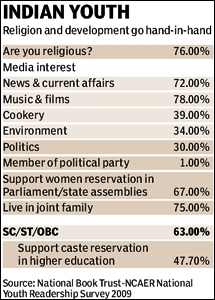Let’s look at some proxy indicators. A massive survey of India’s youth last year by the National Council of Applied Economic Research for National Book Trust throws of some very interesting findings. The survey takes the National Youth Policy’s definition of 13-35 years as youth. The survey, undertaken as part of the National Youth Readership Survey 2009, interviewed over 3,11,431 youth in 432 villages and 199 cities/towns, the biggest by any survey so far. The survey results are for literate youth, who constitute around three-fourths of 459 million youth in the country.
Lest we assume that we’re now a country of atheists or ‘non-religious’ young people, the survey says that a overwhelming proportion, over three-fourths, of India’s literate youth (333 million) said they were religious, with the count of atheists at 2% and non-religious at 15%. These numbers are roughly similar across gender, faith, cities and villages and level of education.
 But it seems being ‘personally religious’ (the specific question was “Irrespective of whether you attend religious services, would you say you’re a religious person?”) does in no way come in way of embracing progressive thoughts and rejecting dogmatism.
But it seems being ‘personally religious’ (the specific question was “Irrespective of whether you attend religious services, would you say you’re a religious person?”) does in no way come in way of embracing progressive thoughts and rejecting dogmatism. Under 1% of literate youth in the country is associated with any political party as a member, lower than memberships for apolitical organisations like self-help groups and youth clubs. The study trashes the ‘fairly competitive and intense student politics at the university and college level’, as non-representative of ‘the political orientation of the literate youth in India’. After all, only a third of all 333 million literate youth in India are students, and less than one in ten literate youth go to colleges for higher education, so indeed why should ‘students politics’ in big cities based colleges be marker for all youth in the country!
Clearly, Indian youth and not political creatures in the sense of belonging to one group or the other, or espousing one ideology over another, but that doesn’t mean they’re apolitical. Far from it. Over a third are interested in politics, higher than the proportion that shows interest in fashion. And a high number (72%) is interested in news & current affairs making them aware citizens.
A large majority (67%) of literate Indian youth support reservation for women in Parliament and state assemblies. And around half are aware of developmental programmes like NREGA and Sarva Shiksha Abhiyan, pointing to a growing trend towards supporting gender & economic inclusiveness.
Importantly, even while two-thirds of India’s literate youth fall in the SC/ST/OBC category, the proportion that support the current caste-based reservation in higher education is under half (47.7%). And this, even when unemployment remains high (around 10%) amongst graduate/post-graduate youth. What this points to is a losing traction for caste-based politics of the Mandal kind that tore through the country’s social fabric in the early 1990s. However, a caveat here is in order. The NCAER-NBT survey is for a period in time (2009) and we don’t have time series figures to compare it with, 1990-91 for instance, the year of the anti-Mandal agitation against OBC reservation. Nonetheless, available anecdotal evidence suggests that indeed caste-based reservation is losing its potency to rally people, for or against it.
What is also important to bear in mind is that a large part of literate Indian youth (75%) still lives in a joint-family, with around three generations under one roof. With conformism a social behaviour even with young people in India, undoubtedly, the general family/elders view has a bearing on the youth’s responses and opinions. In that sense, what the youth of India is articulating here points to a vastly changed India. And that, in a sense, proves that we as people are surely moving away from the bitterness, insularity and parochialism of the past, and for the better.
shailesh.dobhal@expressindia.com
No comments:
Post a Comment